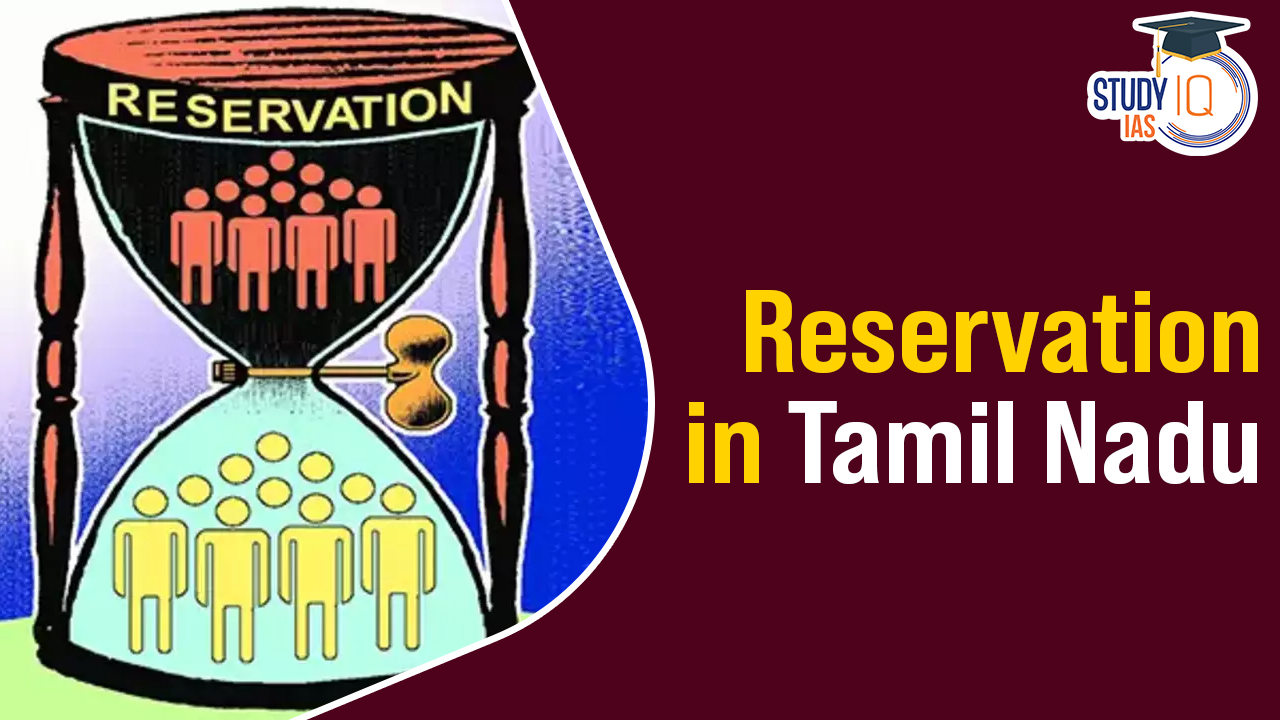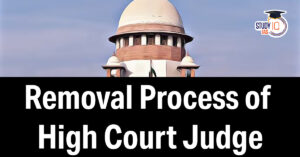Table of Contents
Context: The Tamil Nadu government informed the Madras High Court that since 89% of its population qualifies for the existing 69% reservation in education and public jobs, it cannot be obligated to apply the extra 10% reservation for the Economically Weaker Sections (EWS).
Reservation in Tamil Nadu
- 1983 Ambasankar Commission Findings: Identified that 68% of the state’s population, including backward classes and denotified communities, qualified as socially and educationally backward.
- 2011 Census Data: Recorded Scheduled Castes and Scheduled Tribes in Tamil Nadu at 20% and 1.1%, respectively.
- Coverage: Approximately 89% of Tamil Nadu’s populace is covered under current reservation schemes, leaving only 11% potentially eligible for an EWS quota.
- 103rd Constitutional Amendment Reference: Mentioned the 2019 amendment allowing for a 10% EWS reservation but argued that mere authority does not mandate the state to implement it without substantial justification.
103rd Constitutional Amendment, 2019
Objective
- The 103rd Amendment Act aims to provide reservation for the economically weaker sections (EWS) of society in state employment and educational institutions, including private higher educational institutions, up to a limit of 10% of total available seats.
Inception
- The reservation for Economically Weaker Sections (EWS) was implemented following the recommendations from a commission led by Major General (retd) S R Sinho.
- Established by the government in 2005, the Commission for Economically Backward Classes delivered its report in July 2010.
- Consequently, in January 2019, the Cabinet resolved to introduce the Constitution (103rd Amendment) to offer reservation to the EWS category.
Key Features
- Reservation in Employment and Education: The act allows for job reservations within the central government and admissions in government as well as private educational institutions for EWS citizens.
- Inclusive of All Communities: Targets economically weaker citizens across all societal sectors.
- Additional Quota: Offers a reservation quota that is supplementary to existing reservations, with a cap of 10% in each category.
- Constitutional Mandate: Reinforces Article 46 of the Indian Constitution, encouraging the state to support the educational and economic interests of society’s weaker segments.
We’re now on WhatsApp. Click to Join
Amendments to the Constitution
Article 15 (6)
- Introduces reservations for the economically weaker sections among citizens in admissions to educational institutions.
- This includes private institutions, both aided and unaided by the State, except for minority educational institutions as mentioned in Article 30(1).
- Specifically aimed to benefit those not covered under the reservations provided in Article 15(4) and 15(5), which cater to Scheduled Castes, Scheduled Tribes, and Other Backward Classes.
Article 16 (6)
- Extends reservation to economically weaker sections for government posts, marking a significant expansion of India’s reservation policy to include economic criteria.
- Clarifies that the determination of “economic weakness” will be based on “family income” and other measures of economic disadvantage.
Arguments Against the 103rd Amendment Act
- Rushed Legislation Process: The bill was introduced without prior circulation for discussion or academic input and was not scrutinised by any committee, leading to limited debate on its provisions.
- Challenges in Implementation: Many educational institutions, particularly government ones, lack the infrastructure and resources to accommodate an increase in seats, making the new reservation difficult to implement and potentially overburdening these institutions.
- Concerns of Mediocrity: Critics argue that admitting students under the new quota regardless of merit could dilute the quality of education and lead to a decline in academic standards.
- Constitutional Violation: There’s an argument that providing reservation based on economic status violates the Constitution’s basic structure, which has historically prioritised social backwardness as a criterion for reservation.
- Contrary to Equality: The amendment is seen as contrary to the principle of equal opportunity by offering special privileges to a select group, thereby discriminating against others not covered under the reservation.
Arguments in Favour of the 103rd Amendment Act
- Inclusive of All Economic Backgrounds: The reservation is intended for economically weaker individuals across all religions and castes, moving beyond the traditional criteria of social backwardness.
- Compliance with Basic Structure: The cap of 50% on reservations has been upheld in the past, but the Supreme Court’s previous rulings do not explicitly prohibit extending this cap through legislative action. Hence, proponents argue that the amendment does not violate the basic structure doctrine.
- Economic Welfare Enhancement: By focusing on economic criteria, the amendment aims to uplift those disadvantaged by their economic status, promoting societal economic welfare.
- Reduction of Economic Inequalities: Given the significant economic disparities within Indian society, the amendment seeks to redistribute opportunities more equitably, addressing income inequality.
- Stimulation of Economic Growth: By including economically weaker sections in the demographic dividend, the amendment aims to foster overall economic growth through a more inclusive approach to education and employment.


 Utkal Divas 2025: Odisha Foundation Day ...
Utkal Divas 2025: Odisha Foundation Day ...
 Transfer and Removal Process for High Co...
Transfer and Removal Process for High Co...
 List of Military Exercises of India 2024...
List of Military Exercises of India 2024...





















